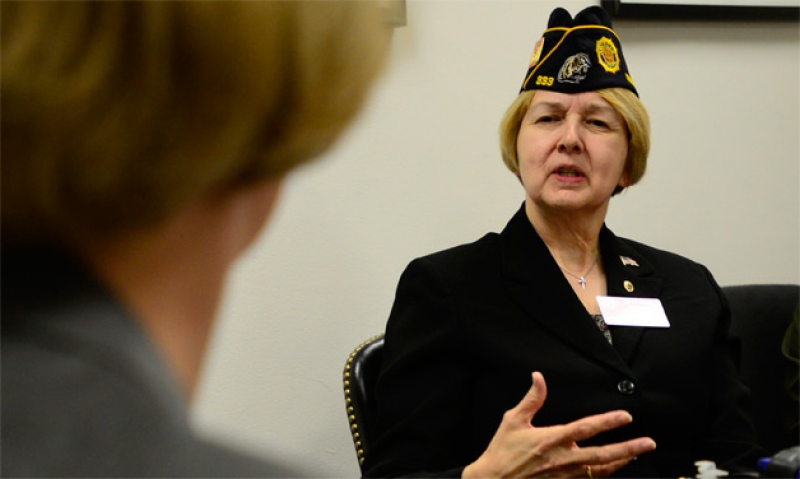
Membership is everyone’s business
The American Legion’s Washington Conference typically is a setting where Legionnaires get updates from members of Congress, and Department of Veterans Affairs and Pentagon staff. This year, however, there was an added topic: membership.
Denise Rohan, chairman of the Legion’s National Membership & Post Activities Committee, called on Legionnaires to help grow the organization, using the Commander’s Call as the venue to do so. She pointed to past Legion successes as keys to spikes in membership – including the drafting of the original GI Bill of Rights – as well as the critical element of individual Legionnaires taking ownership in membership growth.
"It was just three years after the signing of that great piece of legislation that The American Legion first reached 3 million members – 3.3 million to be exact," Rohan said. "What a wonderful time that must have been. It was a time when our representative sought us out to get our opinions on how to govern this great nation. Our governor would actually come to (Michigan) Department Headquarters the Monday following our state conventions to hear about our resolutions and concerns. The nation knew who we were, what we stood for, and veterans wanted to join our ranks.
"The news of our accomplishments spread throughout the nation very quickly. What an incredible feat that must have been, without the conveniences of social media, mobile phones and television campaigns. The news spread fast because each member took membership and their passion for The American Legion personally, and they asked folk to join them and then they gave them a reason to stay. They shared in one single purpose – making America a better place to live."
Rohan said that when the Legion’s membership dips, so does its effectiveness. "A shrinking membership base affects everything — fewer members, less activity, less new leadership, less new ideas, fewer volunteers … (and) less clout here in Washington, D.C.," she said.
And though the organization’s membership is on the decline, Rohan said reversing that trend can be accomplished.
"We are still an organization to be reckoned with, and our support of programs such as Operation Comfort Warriors, Legacy Scholarship and our Americanism and Children and Youth programs are proof of that," she said. "Let’s use these successes as a launching pad to do even better. Considering the serious losses endured by many organizations, The American Legion has done pretty well. We have done and are doing a lot of things right."
Reversing the membership trend will require an organization-wide effort, Rohan explained.
"It is time to help eligible veterans understand that in order for us to continue to help current and future veterans, we need members to pay it forward," she said. "The best way to do that is to become a member of an organization, a family, that has almost 100 years of proven continued service."
"Our challenge in a nutshell is to reverse a trend – stop the membership slide – and design a long-term plan to get us there, and we have done that. It begins by keeping our approach simple. We need to bring in more members than we lose and keep those that we already have."
As easy as that sounds, Rohan said, it requires effort.
"We, as leaders, have to be able to influence those around us to want to do the same," she said. "We are all an important part of the process. We have reached a time where, we — as leaders of The American Legion — must make a number of decisions that I believe will have a far-reaching and long-lasting impact on membership. We have to create that culture of growth."
Rohan said there are a few specific ways to create that growth, including, "active posts in all available local communities across the nation – posts with programs that are designed to improve the quality of life for America. As veterans, we know better than anyone the importance and value of service. Let’s be willing to show others what that means.
"We need to be open to new ideas. We need to serve as mentors to others. We need to build posts in every community where one is needed. We need to continue to remind ourselves that a veteran is a veteran."
Rohan said that while the Legion’s national staff has tools in place to help this effort, sustained membership growth will require buy-in from Legionnaires at every level.
"It will take those of us in this room being or becoming the leaders we need to be, to influence those around us at the department, district and post levels to do their part in growing this organization," she said. "We need to remind our communities who we are and what we stand for, and invite eligible veterans to join our ranks.
"Show our current-day heroes that we are fighting for them, and we need their help by becoming a member of the greatest war-era veterans organization in the country – The American Legion."
